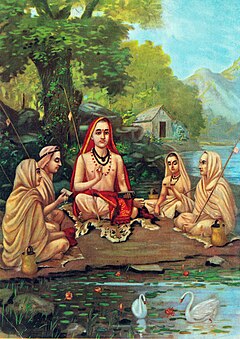Sengaku Mayeda
Sengaku Mayeda | |
|---|---|
| Born | April 1, 1931 |
| Occupation | Writer |
| Awards | Padma Shri Third Order of Merit with the Middle Cordon of the Rising Sun Buddhagunupakan Kancanakiartigun – Highest Decoration of Excellence Japanese Association of Indian and Buddhist Studies Award Academic Achievement Award Japan Academy Award Excellent Book Award |
| Part of a series on |
| Advaita |
|---|
 |
Sengaku Mayeda is a Japanese writer, philosopher and teacher, known for his writings on Indian philosophy and Adi Shankara. He was honoured by the Government of India, in 2014, by bestowing on him the Padma Shri, the fourth highest civilian award, for his services to the fields of literature and education.[1] He is the fourth Japanese to be honoured with Padma Shri, after Taro Nakayama, Shoji Shiba and Prof. Noboru Karashima.[2] He is also a recipient of the Third Order of Merit with the Middle Cordon of the Rising Sun of the Government of Japan, which he received in 2002.[2]
Biography[edit]
Sengaku Mayeda was born on 1 April 1931 at Nagoya, in the prefecture of Aichi, in Japan.[2] He did his pre graduate studies at the College of General Education, in Tokyo and graduated with BA from the Department of Indian Philosophy and Buddhist Studies, Faculty of Letters, University of Tokyo, in 1955. He continued his post graduate studies at the University of Tokyo and secured his MA from the Department of Indian Philosophy, Division of Humanities, in 1957.[3]
His doctoral research was at the same school at the University of Tokyo and obtained a doctorate degree in 1962. This was followed by a doctoral degree, Doctor of Philosophy, from the University of Pennsylvania, under Professor W. Norman Brown in Rigveda and Sanskrit,[2] in the same year and, later, Doctor of Literature from University of Tokyo in 1973.[2][3][4]
In 1961, Sengaku Mayeda got the Harrison Research Fellow from University of Pennsylvania. A year later, he got the Faculty Research Fellowship of the American Institute of Indian Studies of University of Madras where he had the opportunity to associate with the noted philosopher, T. M. P. Mahadevan.[2][5] The next year, he got the Alexander von Humboldt-Stiftung fellowship and worked along with Prof. Paul Hacker[2] at the University of Münster, West Germany.[3]
Mayeda started his teaching career in 1964, joining the University of Pennsylvania as the Assistant Professor of Indian Philosophy. In 1968, he returned to Japan and to research as the Director of the Research Division of Suzuki Research Foundation in Tokyo where he worked till 1973. The next assignment was again at teaching, as the Assistant Professor of Indian Philosophy at University of Tokyo, and he retired as the Professor in 1991.[2][3]
After retirement from the Tokyo University, Mayeda was offered the post of the Professor of Indian Philosophy at Musashino Women's University. Three years later, he became the Vice President and worked there till 1998.[2] He continued as the Professor at the University till 2001 when he gave up on regular teaching.[3]
Sengaku Mayeda has held many important posts related to Philosophy and Indo Japanese relations. He has been a Director of the Indo-Japanese Association since 1983, a post he still holds. He was the President of the Japanese Association of Indian and Buddhist Studies for two terms, first from 1991 to 1995 and then from 1998 till 2002. He was the Chairman of the Graduate School of Human and Cultural Studies at the Musashino Women's University from 1999 to 2001.[3] He has also served as a member of the Steering Committee of Japan-India Friendship Year of the Japanese Ministry of Foreign Affairs. He also worked as a member of the Steering Committee of the Federation Internationale des Societies Philosophie during the period from 2003 to 2008.[2]
Sengaku Mayeda presently holds the posts of the Executive Director of the Eastern Institute, founded by Hajime Nakamura,[2][4] the Chairman of Japan-India Academic Exchange in Humanities and Social Sciences and the President of the Ashikaga Gakko, Ashikaga.[3]
Publications[edit]
Sengaku Mayeda has written extensively about Adi Shakara and the Indian philosophies, by way of published books and articles. Among them, Thousand Teachings: The Upadesasahasri of Sankara, in two volumes, is counted as his masterpiece. The book is a critical study of 27 poetic and 11 prose manuscripts, translated into English by the author.[4]
Some of Mayeda's publications are:[2]
- Book-author
- Sangeku Mayeda (January 1, 1965). The Authenticity of the Upadeshasahasri ascribed to Sankara. See Description. ASIN B005PJBT1U.
- Sengaku Mayeda (Editor/Translator), John M. Koller (Editor/Translator) (January 31, 1992). Thousand Teachings: The Upadesasahasri of Sankara. New York: State University of New York Press. pp. 288. ISBN 9780791409442.
{{cite book}}:|author=has generic name (help) - Sengaku Mayeda; Masahiro Shimoda (June 1, 2010). Spread and Influence of Hinduism and Buddhism in Asia. Low Price Publications. ISBN 978-8184540987.
- Book-editor
- Sengaku Mayeda, ed. (January 1, 2000). Way to Liberation: Indological Studies in Japan Vol.1. Manohar Publishers and Distributors. p. 289. ISBN 978-8173043741.
- Y Matsunami, M Tokunaga, H Marui Edited By: Sengaku Mayeda (Author) (2001). Way to Liberation. Manohar Publishers (IND). ASIN B00CBVS9AE.
{{cite book}}:|author=has generic name (help)
- Articles
He has also been a prolific writer of articles which have been published in many journals of international repute[3] and regularly gives lectures on the subject.[6][7]
Positions held[edit]
Mayeda is the Professor Emeritus, University of Tokyo and Musashino University.[2] He has held, during his career, various positions of importance.
- President - Ashikaga Gakko, Ashikaga[2]
- Director - Japanese Association of Indian and Buddhist Studies[2]
- Director - Association of Buddhist Thought[2]
- Councilor - Japanese Association of Religious Studies[2]
- Chairman - Editorial Committee of the English Tripitaka[2]
- Chairman - Society for the Promotion of Buddhism[2][8]
- President - Nakamura Hajime Eastern Institute, Tokyo[2]
- Director - Nakamura Hajime Memorial Hall, Matsue, Shimane Prefecture[2]
- Advisor - Indo-Japanese Association[2]
- Director - Indo-Japanese Association[2]
- Special Advisor of the Sanin-India Association and Buddhist Studies[2]
Awards and recognitions[edit]
- Padma Shri - Government of India - 2014[1]
- Third Order of Merit with the Middle Cordon of the Rising Sun - Government of Japan - 2002[3]
- Buddhagunupakan Kancanakiartigun – Highest Decoration of Excellence - House of Representatives, Kingdom of Thailand
- Japanese Association of Indian and Buddhist Studies Award[2][3]
- Academic Achievement Award - Nakamura Hajime Eastern Institute[2]
- Japan Academy Prize[2][3]
- Excellent Book Award - Tokyu Kagami Foundation[2][3]
He is a research fellow of the Chinese Academy of Social Sciences, Beijing, China and is a recipient of Doctorate of Literarture (Honoris Causa) from the Buddhasravaka Bhiksu University, Sri Lanka.[2]
See also[edit]
References[edit]
- ^ a b "Padma Awards Announced". Circular. Press Information Bureau, Government of India. January 25, 2014. Archived from the original on February 22, 2014. Retrieved August 23, 2014.
- ^ a b c d e f g h i j k l m n o p q r s t u v w x y z aa ab ac "Embassy Bio" (PDF). Indian Embassy – Tokyo. January 27, 2014. Retrieved August 30, 2014.
- ^ a b c d e f g h i j k l "FISP Profile". Fédération Internationale des Sociétés de Philosophie (International Federation of Philosophical Societies). 2014. Retrieved August 31, 2014.
- ^ a b c "Upadesasahasri of Sankara". Exotic India. 2014. Retrieved August 31, 2014.
- ^ "TMP Mahadevan". Shri Kanchi Kamakoti Peetham. 2014. Retrieved August 31, 2014.
- ^ "Lectures". Japan India Association. 2014. Retrieved August 31, 2014.
- ^ "Lecture 2". Bukkyo Dendo Kyokai. 2014. Retrieved August 31, 2014.
- ^ "Society for Promotion of Buddhism". Bukkyo Dendo Kyokai. 2013. Retrieved August 31, 2014.
External links[edit]
- "List of Books on Amazon.com". Amazon. 2014. Retrieved August 30, 2014.
- "Profile on International Federation of Philosophical Societies". Fédération Internationale des Sociétés de Philosophie (International Federation of Philosophical Societies). 2014. Retrieved August 31, 2014.
- "Author Profile on MLBD". Motilal Banarsidass Publishers. 2009. Retrieved August 31, 2014.
前田專學
まえだ せんがく 前田 專學 | |
|---|---|
| 生誕 | 1931年4月1日(92歳) 愛知県名古屋市 |
| 出身校 | 東京大学文学部印度哲梵文学科卒 東京大学(文学博士の学位授与大学) |
| 職業 | 東京大学名誉教授 中村元東方研究所理事長・東方学院長 |
| 受賞 | 日本印度学仏教学会賞(1972年) 東方学術賞(1981年) 日本学士院賞(1989年) 勲三等旭日中綬章(2002年) パドマ・シュリー勲章(2014年) 仏教伝道文化賞(2020年) |
| インド哲学 - インド発祥の宗教 |
| ヒンドゥー教 |
|---|
 |
前田 專學(まえだ せんがく、1931年4月1日 - )は、インド哲学者、仏教学者、東京大学名誉教授。文学博士。公益財団法人中村元東方研究所理事長・東方学院長。
来歴・人物[編集]
愛知県名古屋市に生まれる。実兄は原始仏教及び上座仏教研究者の前田惠學、祖母は日本画家の前田錦楓。
愛知県立瑞陵高等学校を経て、1955年東京大学文学部印度哲学梵文学科卒。同大学院人文科学研究科修士課程修了後、フルブライト奨学生として米国ペンシルベニア大学大学院東洋学専攻博士課程に留学。修了後、同大学助教授などを経て、1982年に東京大学文学部印度哲学科教授。1991年定年退官、名誉教授。武蔵野大学教授・副学長を歴任。1973年文学博士(東京大学)。
インド哲学仏教学・比較思想学・東洋思想学研究の第一人者だった中村元の直弟子で、後継者の一人。中村元の退官後に講座を継いだ。中村の没後に、インド学仏教学・比較思想および東洋思想の発展を目指し創設した「財団法人東方研究会・東方学院」(現・公益財団法人中村元東方研究所)の理事長・学院長職を引き継いだ。
インド・中国・韓国・アメリカ・ヨーロッパなど世界の国々の学界に学際的研究成果を発表している。なお日本最古の学校である足利学校の庠主(しょうしゅ、学長)に就くなど、人文教育の顕彰も行っている。
学歴・職歴[編集]
- 1955年3月 東京大学文学部印度哲学梵文学科卒業
- 1961年6月 ペンシルベニア大学大学院東洋学専攻博士課程修了(Ph.D.取得)
- 1964年7月 ペンシルベニア大学大学院助教授
- 1973年4月 東京大学助教授(文学博士取得)
- 1982年4月 東京大学教授
- 1991年4月 武蔵野女子大学教授
- 1994年4月 武蔵野女子大学・同短期大学部副学長
- 1998年4月 武蔵野女子大学仏教文化研究所長
- 1999年4月 武蔵野女子大学大学院人間社会・文化研究科長
- 2003年8月 - 2008年8月 A member of the Steering Committee (Comité Directeur) of the Fédération Internationale des Sociétés de Philosophie (FISP).
- 他に現在:武蔵野大学名誉教授、日本学術会議連携会員、国立北京中国社会科学院名誉研究員、日本印度学仏教学会理事(1991年 - 1995年、1998年 - 2002年:理事長)、(財)東京大学仏教青年会理事、公益財団法人日印協会理事[1]、(社)日本移動教室協会理事、(財)仏教学術振興会2010年 - 2012年:理事長、(財)仏教伝道協会英訳大蔵経編集委員会委員長
- 2012年10月 - NPO法人中村元記念館(島根県松江市)館長
- 2012年10月 - NPO法人中村元記念館東洋思想文化研究所長
名誉博士学位[編集]
- 2003年12月 名誉博士(Mahamaopadhyaya, Sri Sri Sitaramdas Omkarnath Samskrita Siksha Samsad)
- 2009年5月 名誉文学博士(Doctor of Literature Degree:Sri Lanka National University of Buddhasravaka Bhikshu, Anuradhapura-Sri Lanaka)
受賞・栄典[編集]
- 1972年8月 第14回日本印度学仏教学会賞
- 1981年1月 第3回東方学術賞
- 1989年5月 日本学士院賞
- 1991年11月 第28回日本翻訳文化賞(『ジャータカ全集』)
- 1992年1月 東京海上各務記念財団優秀図書賞(『インド的思考』)
- 2002年4月 勲三等旭日中綬章[2]
- 2014年4月 インド共和国パドマ・シュリー勲章
- 2020年10月 第54回仏教伝道文化賞
主な著書[編集]
- 『ヴェーダーンタの哲学-シャンカラを中心として』 平楽寺書店〈サーラ叢書〉、1980年 ISBN 4831300241
- 『インド的思考』 春秋社、1991年、新版2018年 ISBN 4393134222
- 『ブッダを語る』 日本放送出版協会〈NHKライブラリー〉、1996年
- 元版は、NHK教育テレビ「こころの時代」放送テキスト(上・下)、1992年
- 増訂版 『ブッダ-その生涯と思想』春秋社、2012年 ISBN 439313561X
- 『インド哲学へのいざない ヴェーダとウパニシャッド』 日本放送出版協会〈NHKライブラリー〉、2000年
- 元版は、NHKラジオ「こころをよむ」放送テキスト(上・下)、1998年
- 増訂版 『インド思想入門 ヴェーダとウパニシャッド』春秋社、2016年 ISBN 4393135911
- 『ラフカディオ・ハーン 源郷としてのインド』春秋社、2021年 ISBN 4393112792
- 電子出版
- 『ブッダのおしえとインドの思想 前田專學講演録』響流書房、2017年
博士論文[編集]
- 『Shankara's Upadeshasahasri, Critically ed. with Introduction and Indices(Hokuseido Press), A Thousand Teachings(University of Tokyo Press and State University of New York Press)1973など。
主な編著[編集]
- 『インド思想史』 早島鏡正ほか、東京大学出版会、1982年 ISBN 413-012015-8
- 『東洋における人間観 インド思想と仏教を中心として』 東京大学出版会、1987年 ISBN 4130160125
- 『インド中世思想研究』 春秋社、1991年 ISBN 4393111761
- 『親鸞入門 その生涯と教えの深さ』 永田文昌堂、2000年 ISBN 4816261540
- 『ブッダに学ぶさとりの言葉』奈良康明 石上善應ほか(分担執筆)、仏教伝道協会、2018年 ISBN 4892375195
主な翻訳[編集]
- 『ジャータカ全集(3) 第191話-第300話』 春秋社、1982年 ISBN 4393116232
- シャンカラ 『ウパデーシャ・サーハスリー 真実の自己の探求』 岩波文庫、1988年 ISBN 4003326415
- ハリ・プラサード・シャーストリー『こころに響く日本 1916~1918: あるヒンドゥー思想家の訪日印象記』響流書房、2019年(電子書籍)
脚注[編集]
- ^ “日印協会役員等一覧”. 公益財団法人日印協会. 2014年4月4日閲覧。
- ^ “学春の叙勲、褒章―私学人多数”. 全私学新聞 (2002年5月3日). 2023年5月23日閲覧。
参考資料[編集]
- 『〈我〉の思想 前田専学博士還暦記念論集』 東京大学文学部印度哲学研究室編、春秋社、1991年.ISBN 4393111788
- 『梵音 清水寺仏教文化講座第5回講義録』 安来清水寺(島根県安来市)、2009年

